

By Our Editorial Team
First publised on 2022-05-19 06:35:19
The Supreme Court used the extraordinary powers granted to it under Article 142 of the Constitution to do complete justice in a case to release A G Perarivalan, a convict in the Rajiv Gandhi assassination case who has been in jail for 31 years now. The case before the court was complex and involved the questions of the powers of the state government, the powers and role of the Governor, the powers and role of the Centre and the role of the judiciary in such cases.
The verdict has reaffirmed that as per the Constitution, the governor of a state is bound by the advice of the elected government in the state, more so "in matters relating to commutation/remission of sentence under Article 161". In the instant case, the Tamil Nadu government used the power granted to it under the said Article to petition the governor to remit Perarivalan jail term in 2018. But the governor chose to sit on the same. Later, in a move that is not allowed under the Constitution, he made a reference of the petition to the President, who also chose not to take any action. The Supreme Court has clearly said that the governor exceeded his brief and should have allowed the petition as forwarded to him by an elected government.
The court expressly said that if constitutional functionaries do not exercise the powers granted to them or inordinately delay taking a decision, the judiciary can step in to provide relief. Hence, in this case, the court was constrained to use Article 142 and do complete justice in the case by releasing Perarivalan who was languishing in jail even after the state government had decided to remit his term but the decision could not be carried out due to the inaction of the Governor. In calling the governor "but a shorthand expression for the state government", the Supreme Court has clearly indicated that, as per the Constitution, an elected government in supreme in India's federal structure.











